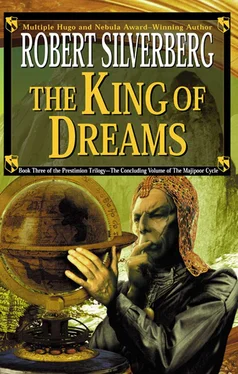His voice sounded strange in his own ears. He understood that he must still not have fully shaken off the effect of having donned that helmet. These three men still seemed like insects to him. They had no significance whatsoever.
“Your brother,” he said to Barjazid, speaking as though the other two were not in the room, “was standing right next to me, with his own helmet on. He and Prestimion were having a duel of some sort with their helmets, hundreds of miles apart, thousands, maybe. I saw your brother collecting himself for one final thrust; but before he could unleash it, Prestimion hit him with the helmet-force and knocked him to his knees. ‘ Prestimion, ’ your brother said, and started to moan, and Prestimion struck him once or twice more, and I could see then that his mind was altogether burned out. An hour or two later Septach Melayn and Gialaurys burst upon us. One of them came upon him and slew him.”
“As we will slay Prestimion,” said the Lord Gaviral grandly.
Mandralisca acted as though Gaviral had not said anything. Slay Prestimion? That was no answer to the problem of attaining freedom for the western continent. Constrain Prestimion, yes. Control him. Use him. That was what this helmet would achieve, in the fullness of time. But why kill him? That would only put Dekkeret into the high seat of power at the Labyrinth and bring some other Coronal to the summit of Castle Mount, and they would have to start the process of extricating Zimroel from the grip of Alhanroel all over again. It was hopeless, though, to expect any of the Five Lords to understand such things before they were explained to them.
“The helmet will give us our revenge, yes,” said Khaymak Barjazid.
Mandralisca ignored that too. It was such a commonplace thing to say. And it was not even sincere, Mandralisca thought. Barjazid had no interest in revenge. His brother’s death at Prestimion’s hand did not seem to matter greatly to him. He would just as readily have sold himself to his brother’s killers as to his brother’s killers’ enemies, if the price had been right. The selling was all that mattered. What interested this Barjazid most was money, security, comfort: petty unimportant things, all three. There was a bright spark of malevolence in Barjazid that Mandralisca appreciated, a chilly malign intelligence, but the man was fundamentally trivial, a little bundle of unusual marketable skills and very ordinary hungers.
Mandralisca’s restlessness had returned. The stink of other human flesh in the room was becoming unendurable now. The heat. The pressure of other consciousnesses too close against his own.
He gathered up the flimsy little helmet and tucked it like so much pocket-change into a pouch at his hip. “Going outside,” he said. “Too warm in here. Some fresh air.”
The long shadows of afternoon were beginning to creep westward across the ridge. The palaces of the Five Lords, up there on the summit of the hill overlooking the village, were bathed in ruddy light. Mandralisca walked through the village in long strides, no particular destination in mind. The other three men followed along behind, struggling to keep up with him.
Such small men, he thought. Gaviral. Halefice. Barjazid. Small of stature, small of soul as well. Halefice, for one, knew it: he wanted only to serve. Gaviral dreamed of reigning as a king here in Zimroel, and was no more fitted for it than a rock-monkey would be. And ugly little Bar-jazid—well, he had his merits, he was tough and smart, at least. Mandralisca did not entirely despise him. But essentially he was nothing. Nothing.
“Your grace?” Halefice had caught up with him. The aide-de-camp said, “Begging your pardon, your grace, but perhaps your use of that device has tired you more than you realize, and you should rest for a time, instead of—”
“Thank you, Jacomin. I’ll be all right.” Mandralisca kept on moving, not even facing toward Halefice as he spoke. They were in the thick of the village, now, among the smiths and the pot-sellers, with the wineshops just beyond, and then the market of breads and meats.
It had not been an easy matter, building a self-sufficient village out here in this dry desolate land, where crops had to be coaxed from the unwilling red earth with the aid of water pumped drop by drop from the maddeningly unreachable river just over the hill, but they had done it. He had done it. He knew nothing about farming, nothing about raising livestock, nothing about creating villages out of thin air, but he had done it, he had drawn the plans and given the orders and made it happen, even to the lavish palaces of the Five Lords at the top of the ridge, and now, striding through it this strange afternoon, he felt—what?
A sense of anticipation. A sense of standing at the threshold of a new place, a strange and wonderful place.
Already he held the Five Lords of Zimroel in his hands, whether they knew it or not. Soon he would hold Prestimion and Dekkeret as well. He would be the master of all Majipoor. Was that not a fine thing, for a country boy of the snowy Gonghar land who had started out in life with no assets other than a quick mind and lightning-swift reflexes?
He passed the wine-shops, shaking off flasks that the merchants there eagerly implored him to take, and went on through the bread-market. One of the bread-sellers put a biscuit into his hand with a reverent bow and a murmured prayer. There was awe in his eyes, as though he and not Gaviral were a Lord of Zimroel. The wine-merchants and bread-sellers understand, Mandralisca thought, where the real power resides in this place. He bit into the biscuit—it was one of the little round ones called a lorica, with a topknot on the upper side to make it seem something like a crown. A good choice, thought Mandralisca. He devoured it in three bites.
On the far side of the bread-market the ridge rose sharply to a point where one could see the river far below, boiling and churning against the foot of the cliff. He strode toward it. Halefice still walked along beside him on the left, a step or two to the rear. Barjazid was on the other side. The Lord Gaviral did not seem to have followed them up the hill from the marketplace.
Mandralisca stood staring at the river for a long while without speaking. Then he drew the helmet from his pouch. It rested in the palm of his open hand, a bunched-up little mass of metal mesh. Barjazid gave him a worried look, as though wondering if Mandralisca might have it in mind to hurl it into the water below.
To the Suvraelinu he said suddenly, “Barjazid, did you ever want to kill your father?”
That drew a startled glance. “My father was a kindly man, your grace. A merchant who dealt in hides and dried beef, in Tolaghai city. It would never have entered my mind—”
“It entered mine, a thousand times a day. If my father were still alive now I’d put this helmet on and try to kill him with it right now.”
Barjazid was too astounded to answer. He and Halefice were both peering at him strangely.
Mandralisca had never spoken of these things with anyone. But those few seconds of using the Barjazid helmet had opened something in his soul, apparently.
“He was a merchant too,” he said. He looked straight out into the river gorge, and the hated past swam before his eyes. “In Ibykos, which is a muddy trifling little town in the scarp country of the Gonghars, a hundred miles west of Velathys. It rains there all summer and snows all winter. He dealt in wines and brandies, and was his own best customer, and when he was drunk, as almost always he was, he would hit you just as readily as look at you. That was how he talked to you, with his hands. It was in my boyhood that I learned to move as quickly as I do. To jump back fast—out of his reach.”
Читать дальше












